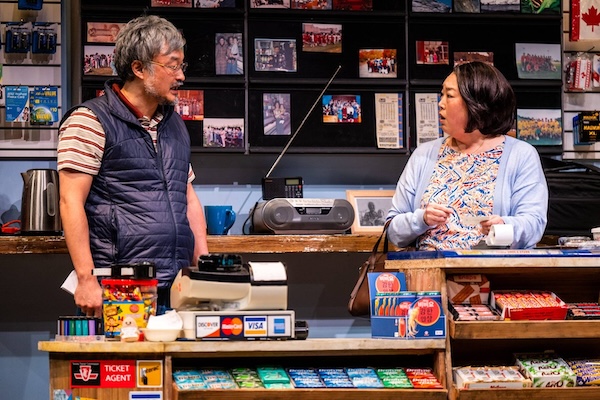An Enduring Delight
Kim’s Convenience by Ins Choi was a hit in Canadian fringe theater (Choi playing the troubled son, Jung), then a five-year Netflix series and now (with Choi as Appa, the patriarch and proprietor of the titular Canadian convenience store) returns to its roots in theater. Having no previous experience of the original play or the TV series, I nonetheless sensed its history and readily understood its lasting popularity. Kim’s Convenience in this iteration is the immigrant story on sitcom speed-dial, the expected angst and conflict present but skillfully relieved by laughs.
Choi based the drama on his family’s experience as Korean immigrants to Canada, choosing a refreshing focus on humor as antidote to the predictable alienation. At opening, grey-haired Appa (Ins Choi) in a puffy vest and wire-frames softly sings in Korean as he opens the store. He embodies a sort of neutral sadness and resignation as he performs the small tasks of a shopkeeper. (We later learn that Appa had been a teacher in Korea, but his thickly accented English precluded teaching in Canada.) Then he glances out a door unseen by the audience, is at once engaged and lively, and yells, “Call the police!”
Daughter Janet (Kelly Seo) hurries onstage, concerned until she learns that the crisis involves a white Honda illegally parked in front of the store. A Japanese car! Janet has been through this many times and Seo deftly conveys the “Oh, for crying out loud, not again!” response of an immigrant offspring to an immigrant parent’s cultural eccentricity. Appa nurses a peevishness about Japan’s 1904 attack on Korea (long before he was born) that now manifests in his disdain for Japanese cars. The recurrent set piece both sustains his Korean identity and brings laughs, angst offset by humor.
Janet exits, presumably to call the police, allowing the first of four appearances by Brandon McKnight as four different Black residents of the neighborhood, Rich, Alex, Mr. Lee and Mike. McKnight is fantastic in all four roles, each openly illuminating touchy aspects of immigrant/Black cultural conflict. In the first, language is highlighted as Appa’s accent rises to incomprehensibility and McKnight does a masterful riff on Black street patois. The audience can’t understand either of them and it’s funny. Politically incorrect, but for once it’s okay to laugh. Playwright Choi’s bravura in deliberately violating all the p.c. codes with warmth and humor allows an audience bonding experience that may to some extent account for the play’s enduring appeal.
Later McKnight in a fashionable suit reappears as Mr. Lee, a real estate developer who offers Appa a very impressive sum for the store. A condo complex is under construction nearby, the neighborhood is changing and Mr. Lee (McKnight) realistically outlines Appa’s possible futures. He can stay and age behind the counter or sell and live comfortably in retirement. Appa refuses the offer but keeps Lee’s business card, the focus less on gentrification than on the meaning of Appa’s life, at this point, the store.
Janet (Seo), who at thirty is unmarried and trying to make a career as a photographer, returns in time for Appa’s “steal, no steal” monologue defining exactly which ethnic, sexual, racial, religious or other forbidden identity, either alone or with another, may be expected to shoplift. Again, it’s funny. She objects in outrage, to which Appa merely replies, “I say what I see.”
There is a missing son, Jung, two years older than Janet, whose story was unclear. A high school soccer star and good student, he apparently went off the rails at some point and stole the contents of the store’s safe. There was mention of rehab, but no detail, and his absence haunts the family. When a police officer (Alex (McKnight) arrives in response to Janet’s earlier call (about the illegally parked white Honda), he asks about Jung, with whom he was close in high school. Nobody answers, but his question is quickly overshadowed by the romantic attraction he and Janet feel, deftly deferred by Appa’s always-quirky interference.
Appa, still deeply identified with the store, wants Janet to take over, become the owner. But she has no interest, defining the intergenerational immigrant conflict with her response, “You did what you had to do so I could do what I want to do!”
Umma (Esther Chung), Appa’s wife, has almost no presence in the play except for an emotional scene in which she sings (possibly the same Korean song Appa sings at the opening) and is joined in singing by Jung (Ryan Jinn), standing with the audience in an aisle. He joins his mother onstage, reveals that he has a two-month-old son and is miserable. A recent get-together with his old friends, all of whom are happy and successful, has demonstrated the mess he’s made of his life. I wasn’t sure whether this moment was real or merely Umma’s fantasy, but when Jung turns up at the store, alone with Appa as he considers Mr. Lee’s financial offer, the reality is clear.
The conclusion, a bit kitschy and obvious but realistically not particularly ideal for Jung or Appa, involves Appa realizing that his life is his children and now his grandson, not the store. He gives the store to Jung, who happily takes his place behind the counter.
The story is told almost entirely in the characters of Appa and Janet, he the valiant but weary immigrant parent and she torn by love and loyalty but ultimately able to possess an identity entirely her own. Joanna Yu’s scrupulously designed set, an ordinary convenience store familiar to everybody, allows everybody to feel at home with people and issues beyond personal experience. Kim’s Convenience just feels good.
Adam Blanshay Productions presents the Soulpepper Theatre Company production in association with American Conservatory Theater. Kim’s Convenience, by Ins Choi and directed by Weyni Mengesha, is at the Calderwood Pavilion, 527 Tremont Street, Boston, MA, from Thursday, Nov. 6, through Sunday, Nov. 30, 2025. Tickets: 617 266-0800. huntingtontheatre.org









